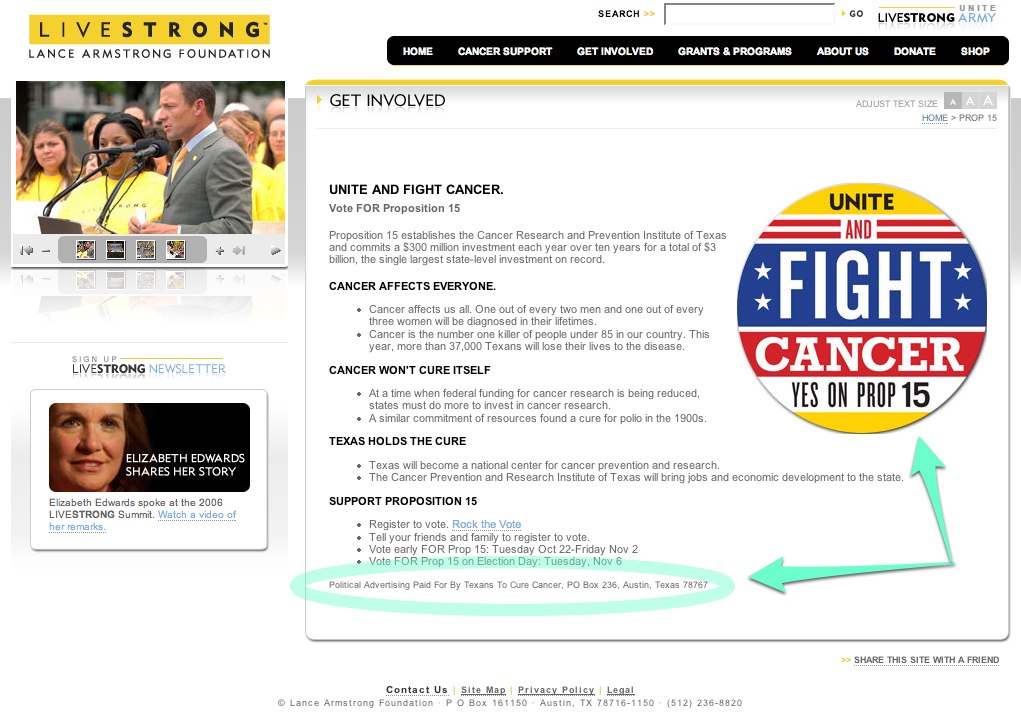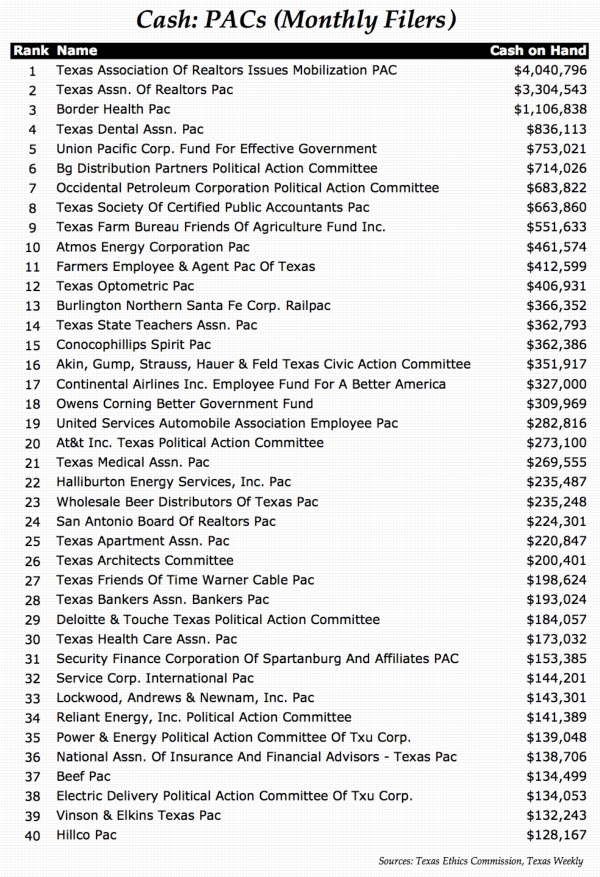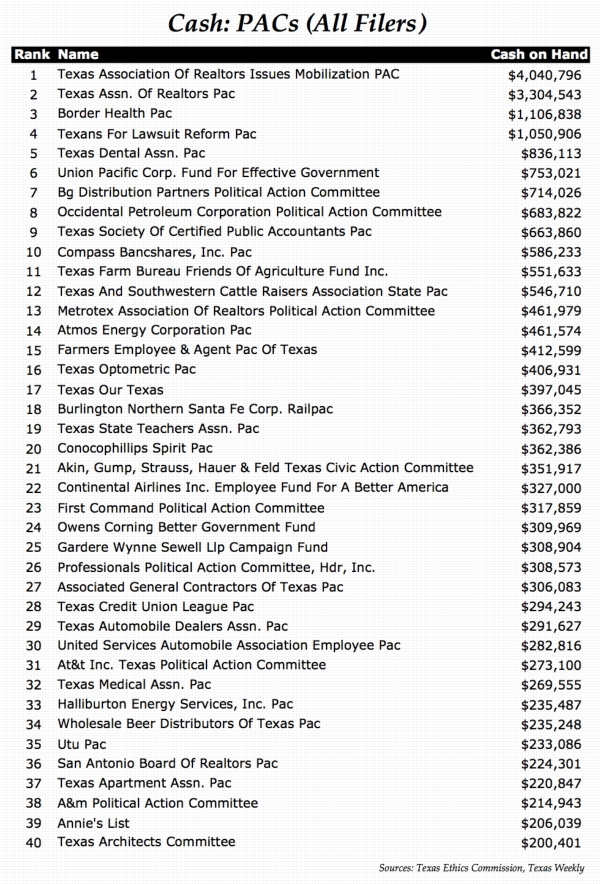The Senate race among John Cornyn, Rick Noriega and Mikal Watts resurged into blogospheric prominence this week. Bloggers also canvassed regional contests and criticized traditional forms of media. And, there's a list of items for the back-to-school season...
* * * * *
Senatorial September
Burnt Orange Report wrestles with revelations that Republican aficionado Bob Perry has donated $7,000 to Democratic candidate Noriega (and more to wife Melissa Noriega, a Houston city council member), and asks readers to offer their own opinions in an online poll. So what if Noriega has taken money from a Republican? says Capitol Annex. At least he hasn't given money to Republicans, as Watts has.
Annex has a video of Noriega calling for an end to the Iraq war, and relays a post from Keeping Terrell in the Loop that trashes the incumbent Cornyn. Texas Politics, the Houston Chronicle's blog, has a handful of videos of the candidates. At worst, Democrats will gain four seats in the U.S. Senate in 2008, Half Empty predicts, suggesting that Cornyn find another job, maybe as a hand model.
Half Empty deconstructs Watts's Q & A session with the Young Democrats at the University of Texas at Austin, here and here. Texas Kaos does likewise, here.
Off the Kuff says Noriega "scored a touchdown" with recent endorsements by Cameron County officials and posts Noriega's statement about the death of Sgt. Omar Mora, one of the writers of a New York Times op-ed piece critical of the Iraq War.
Postcards from the Trail, the Austin American-Statesman's blog, surmises that Watts's big money could "inadvertently raise Noriega's profile with voters. This prospect assumes, of course, that Watts mentions Noriega by name." Noriega's campaign consultant James Aldrete tells Texas Politics that they ain't skeered.
The Texas Cloverleaf thinks the Democratic campaigners should portray Cornyn as a "friend of Big Tobacco and hater of small children." Meanwhile, musings writes, "Cornyn is often called Bush's lapdog, and the slobber was certainly flowing today." Trail Blazers, the Dallas Morning News's blog, has background information on Cornyn's new campaign director, Rob Jesmer.
* * * * *
Around the Horn
The Web site of Republican congressional candidate Jim McGrody is "quite impressive," says Burnt Orange. The retired publisher is aiming to supplant Democratic U.S. Rep. Ciro Rodriguez and is having a fundraiser on Sept. 26, according to Walker Report. In other CD-23 news, Republican candidate Quico Canseco is barking up the wrong tree when he accuses the "blue dog" Rodriguez of following orders from MoveOn.org, according to Annex.
Republican Alan Steinberg has tossed his hat into the CD-22 ring. He's young, he blogs, and he's "sure to have his hat handed to him by [Shelley] Sekula-Gibbs (sic) and [Robert] Talton in the primary," Annex says. In a different post, Annex wonders, "Are Republicans Moving In A Virginia Ringer To Challenge Chet Edwards"?
Greg's Opinion has a rundown of Houston's municipal elections. Kuff interviews council candidate Joe Trevino, who's gunning for Position 5. Opponent Jack Christie dropped his bid for the seat recently, because of a Houston Chronicle article exposing that he doesn't live in the district, says Houtopia. Candidate Zaf Tahir faces similar allegations, but Kuff thinks it'll blow over. "Kind of hard to promote the city and solve it's (sic) problems when you don't think enough of it to sleep over," laments The Wartime Consigliere.
"I think former Houston police chief C.O. Bradford has a great chance to knock off Harris County DA Chuck Rosenthal in the 2008 elections," says Grits for Breakfast. And Burnt Orange reports on Joel Burns, a former Fort Worth school board trustee who is one of six vying to replace Wendy Davis on the city council.
Half Empty declares that Ron Reynolds is not a "Craddick D." Reynolds will face incumbent State Rep. Dora Olivo, D-Rosenberg, in the primary. Meanwhile, Dallas.org is offering a $100 reward for video and audio of any city employee campaigning for or against the Trinity River Corridor Project.
Consigliere gives an update on the Republican primary contest between Charles ("Chicklet") Bacarisse and Ed Emmett for Harris County Judge, while Annex relays a list of the more than 100 school districts who are calling tax rate elections.
State Rep. Patrick Rose, D-Dripping Springs, is shopping for statewide office, sneers McBlogger. What does this mean for Houston Mayor Bill White, wonders Burnt Orange.
Larry Joe Doherty, of Texas Justice fame, opened his campaign headquarters in CD-7, which could be an issue because the Democrat is running in CD-10, says Burnt Orange. In an unrelated matter, In the Pink posts video of a political advertisement for State Sen. Kirk Watson, D-Austin. "I've never seen Watson run that fast," she comments. [eds. Note: it's a knock-off of a commercial that helped the late U.S. Sen. Paul Wellstone beat an incumbent Republican.]
Here's Wellstone:
And Watson:
* * * * *
M$M Melee: Double-Standard Alert
In the Pink swears off books because of Bill Clinton, and PinkDome swears off the Dallas Morning News because its Web site "is excruciating."
Kaos takes the Fort Worth Star-Telegram to task for a hatchet job on a letter to the editor written by Kaos. The Star-Telegram subsequently promised to reprint the letter in its original, though spell-checked, form. Meanwhile, Texas Monthly's BurkaBlog made a mistake in a post mentioning Annex, complains Annex.
Brains and Eggs sums up the "blogswarm" stemming from a San Antonio Express-News/Houston Chronicle article containing statements by blog-favored senatorial candidate Noriega that weren't friendly toward blogs. The pro-Noriega bloggers who loved a negative Watts story are worked up about the same reporter quoting their guy's comparison of left-wing bloggers and right-wing radio talk show folk.
Burnt Orange accuses reporter R.G. Ratcliffe of taking a "cheap shot" at Matt Glazer;McBlogger asserts that Noriega's quote was taken out of context "R.G. Ratcliffe, acting as a lap-dog for the political establishment, deliberately set out to drive a wedge between Rick and some of his strongest supporters in his article," Annex opines.
Annex says Ratcliffe got played by the Watts campaign. Half Empty agrees and tells Ratcliffe to go back to J-school. Greg says Noriega is the one who screwed up, but at least owned up to his mistake. Bloggers still like Noriega more than Watts, who "doesn't want you to read blogs," posts Annex.
"My oh my, bloggers have thin skins," responds Ratcliffe in Texas Politics.
* * * * *
Course Schedule
Astronomy: "Latinos Uniting? And Are the planets aligning?" marvels Dos Centavos.
Business Class: This is the name of a new blog by Charlie Ray of PinkDome, courtesyof Capitol Crowd.
Criminal Justice: Grits for Breakfast posts the Aug. 13 Texas Youth Commission report to the Legislature. Grits breaks it down, concluding that TYC expects recidivism rates to increase and noting that more than 80 percent of TYC inmates who requested counseling this spring were diagnosed with Post-Traumatic Stress Disorder. Executive Commissioner Dimitria Pope is "passing the buck" to "small groups of hand-picked insiders," Grits says. He also posts an April evaluation of the TYC by the American Correctional Association.
Driver's Ed: By the Bayou explains why Texas needs red-light cameras and the like.
Environmental Science: Burnt Orange highlights Environment Texas' latest legislative scorecard. Annex's take is here.
Journalism: Walker's Report links to the newest edition of the South Texas Republicans' newsletter.
Music: Matthew Dowd, former chief strategist for George W. Bush, got picked up by U2's Bono, says In the Pink.
Rhetoric: Austin city council member Mike Martinez gives a lesson in clear communication to Toby Futrell, as relayed by McBlogger.
Sociology: Austinist explores what it's like to hail from California but live in Austin.
Texas History: Houstoned distills the history of the Lone Star state into four sentences. Texas Politics notes the disappearance of a press release by the Texas Historical Commission on the disputed Davy Crockett letter.
This edition of Out There was compiled and written by Patrick Brendel, who hails from Victoria and finds Austin's climate pleasantly arid. We cherry-pick the state's political blogs each week, looking for news, info, gossip, and new jokes. The opinions here belong (mostly) to the bloggers, and we're including their links so you can hunt them down if you wish. Our blogroll — the list of Texas blogs we watch — is on our links page, and if you know of a Texas political blog that ought to be on it, just shoot us a note. Please send comments, suggestions, gripes or retorts to Texas Weekly editor Ross Ramsey.






